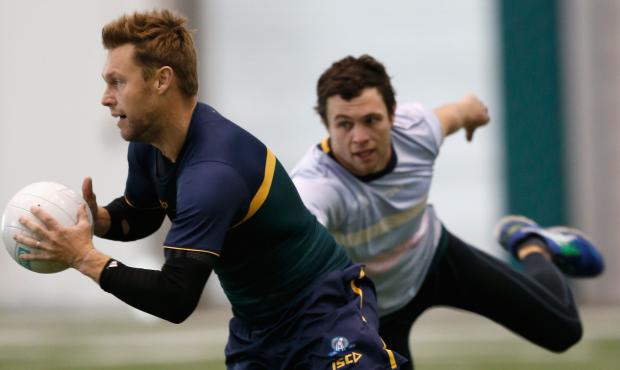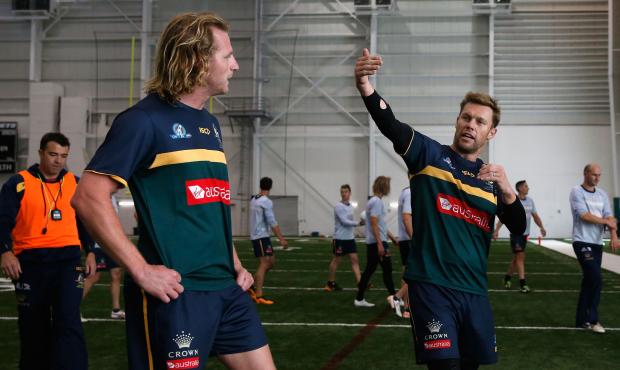SAM Mitchell's grin remained a mile wide as he settled into his seat near the front of the team bus after the squad's practice match at the New York Jets' indoor training facility on Saturday.
He had been the last player to leave the artificial surface, toe-poking the ball around the green turf marked in white with NFL measurements.
"I'm just a big kid," Mitchell told AFL.com.au.
That 33-year-old 'big kid' is making the most of every minute of this opportunity to travel to New York and prepare for the Virgin Australia International Rules Series.
Not only has he been pounding Manhattan's pavement with wife Lyndall and a pusher carrying his son Smith for company, he has been indulging his love of American sport.
When the New York Jets played the Buffalo Bills at MetLife Stadium on Thursday night, he did not miss a moment's action, staying in the rain to watch from the best angle before dissecting the game on the way home.
That he can watch and learn from any number of games is no surprise.
Mitchell has long had a reputation as one of the game's smartest players, a fact that becomes more entrenched as each season passes.
He could find space in peak hour in Times Square and makes such good decisions you'd imagine getting to his destination on the subway would be a breeze.
But most importantly, his love for the game and its challenges remain undiminished.
"You can never master this game. This game is always the master and I am just trying to keep up with it," Mitchell said.
The comment perhaps explains why Mitchell's continual search for improvement seems never-ending, even after 285 games, four premierships and four club best and fairests.
When asked what he has left to achieve, he recalls a rueful comment Arsenal manager Arsene Wegener once made that he was either blessed or cursed with discontent.
Mitchell feels the same way when it comes to what the Hawks have achieved in his career.
"I've never looked back and thought 'Gee, we have done well'," Mitchell said.
"I know that it is true. When I say that, it makes sense but I don't feel it. I can say it but I don't feel it."

Sam Mitchell evades a Hayden Ballantyne tackle in a practice match in New York.
His constant search for improvement is managed well at Hawthorn where such thinking has become part of the club ethos.
Mitchell can sell his ideas to a receptive coaching audience. If he gets the go-ahead to try something new, there are no recriminations if the idea doesn't work. If it does work, the team improves.
That approach keeps the players engaged in their team and what it needs to do to get better and better.
"[It] does make you want to keep thinking about the game [and] not just to get your pay cheque and go home," Mitchell said.
Mitchell's obvious intent and input at the breaks during the hastily arranged practice match at the Jets facility demonstrated he's taking a similarly committed approach into preparing for the Test match against Ireland at Croke Park on November 21.
He thinks the International Rules game suits him because there is a little more space, it's slightly easier to move the ball around, and tackling is more difficult.
And it comes with the joy of playing alongside the game's best players.
You only have to watch Mitchell to know he is one of the very best in that group but his record makes a good case for him too – an exceptional list of achievements given the doubters when his name was mentioned early in his career.
Perhaps that aspect of his football story is why Mitchell says what he loves best about Australian football is that, like the Manhattan skyline, Australia's game can find a spot for both talls and smalls.
It can also find a place for quick and slow, inside and outside, rough and tumble or refined and, says Mitchell, the game is getting even better as it evolves at making the most of those differences.
He suspects there is a lingering misconception among observers that you have to excel at everything to play the game now, whereas the game is moving the other way.
When Mitchell, Luke Hodge and Jordan Lewis first started that wasn't the case.
They worked on their running.
If Billy Hartung and Brad Hill had arrived in that era, they would have been sent to the weights room.

Sam Mitchell and David Mundy talk tactics at training in New York.
Now players are trained to become better at what they are good at, rather than being hammered to improve their weaknesses.
"Everyone had to be a good runner but now if you're not a great runner, there is still a place for you and if you are a great runner and not great at contested footy there is still a place for you," Mitchell said.
It's then up to the team and game plan to maximise individual strengths and minimise the effect of their weaknesses.
"[It's a] better spectacle to watch, a better game to play and I think it makes it more enjoyable because you're not having to work on something you're no good at," Mitchell said.
"You work on something you actually enjoy."
There is no doubt Mitchell has enjoyed this opportunity in New York, particularly the chance to share the experience with his wife and son.
"That's the best part," Mitchell said.
However the best part for members of the Australian team who don't play for Hawthorn is that, for once, Mitchell is on their team.
That's enough to put a smile on the face of everyone on the team bus as they see up close why he has become one of the era's most dominant players.




